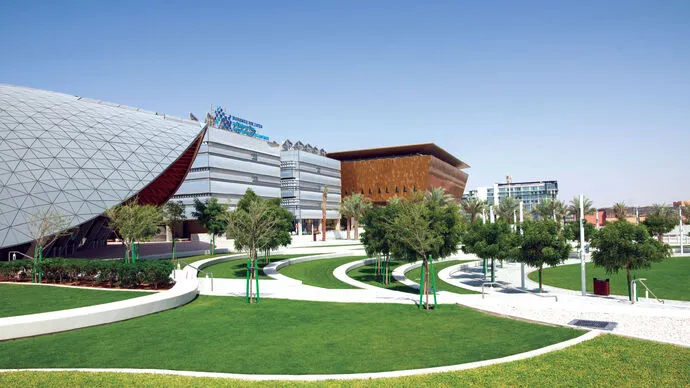- Web
- Feb 05, 2026
Abu Dhabi’s MBZUAI poised to become Gulf’s Stanford in artificial intelligence
-

- Web Desk Karachi
- May 26, 2025

ABU DHABI, UNITED ARAB EMIRATES: A few weeks before Donald Trump announced plans to lift semiconductor restrictions on the United Arab Emirates, a move with the potential to supercharge the region’s AI development, Eric Xing sat in his office in Abu Dhabi and discussed what the future might look like.
Xing, a computer scientist who previously taught at Stanford and Carnegie Mellon, is president of Mohamed bin Zayed University of AI, a six-year old institution uniquely positioned to shape the coming AI boom. Xing, repeatedly mentioned his ambition of making MBZUAI the Stanford of the Gulf, pointing to California school’s role in nurturing a culture of innovation and entrepreneurship whose effects have rippled far beyond Silicon Valley.
The UAE is on a mission to become a global player in AI. The country appointed the world’s first AI minister back in 2017, and mandated this month that all primary schools added AI-based topics like algorithmic bias and prompt engineering to their curriculum. With MBZUAI named after the UAE leader, it is taking things further; the schools is aiming to be a feeder for Emirati companies, which now mostly hire engineers from abroad; an incubator for homegrown startups; and an AI research and development arm for the UAE. While the UAE has poured billions into building AI, MBZUAI wants to make the country less dependent on foreign talent and companies. Its role, in Xing’s words, is “train the people who can carry out the work.”
UAE to build biggest AI campus outside US in Trump deal, bypassing past China worries
Trump may have just given the school a leg up in these ambitions. On his recent trip to the region, the US president framed a potential “US-UAE AI Acceleration Partnership” as a way to strengthen business ties between the two countries, and solidify the US lead in the field, reported Bloomberg.
Under the terms of the agreement, the UAE would be allowed to import 500,000 of the most advanced chips every year between now and 2027, with a fifth set aside for G42, the country’s all-purpose AI company.
That’s a notable break with previous US strategy according to Kristin Diwan, a senior resident scholar at the Arab Gulf States Institute in Washington, DC. Over the past two decades, as the country has strengthened its ties with China, US administrations responded by restricting UAE access to semiconductors and sensitive technologies. Last year, G42 agreed to divest from China upon entering a partnership with Microsoft. By contrast, this latest proposal does not demand any Emirati concessions on ties with China.
Diwan describes that as “a massive win for the UAE’s ambitions to become a central hub in the global tech economy.”
The administration’s recent decision to revoke Harvard’s ability to enrol foreign students could also benefit the region, as international students may now look outside the US for educational opportunities.
Just under a fifth of the nearly 400 graduate students at MBZUAI come from Emirates. The rest mostly hail from China, India, Kazakhstan and Egypt, which increasingly have trouble ending students to study in the US and UK. So far, the school has granted 20 master’s degrees and eight doctorates and will welcome its first undergraduate class in the fall.
Designed by British architect Norman Foster, the campus is new, sleek and expensive. It is designed to prepare graduates for the tech workforce. To lure talent, the school offers pay packages that are “more favourable” than those a top-tier schools, said Elizabeth Churchill, who left Google last year to start the human-computer interaction department. Two years ago, the institution debuted what it described as “the world’s most advanced Arabic large language models.”




